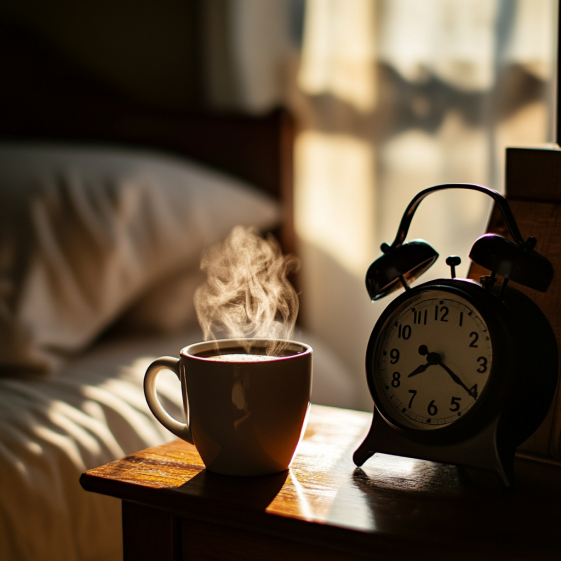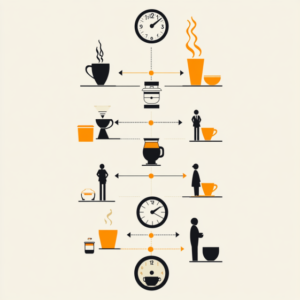☕ Caffeine and Sleep: How to Enjoy Your Coffee Without Losing Rest
You love your morning coffee—it’s warm, comforting, and frankly, necessary. But what happens when that cozy cup of joe turns into tossing and turning at night? If you’ve ever stared at the ceiling wondering why you’re wide awake at midnight, your afternoon latte might be the culprit.
The relationship between caffeine and sleep is sneakier than you’d think. It gives you that perfect energy boost, but it can also quietly sabotage your rest if you’re not careful about timing.
So how late is too late to sip that last cup? Let’s break it down.
🧠 What’s Really Going On Between Caffeine and Sleep?
Here’s the science, simplified: caffeine blocks adenosine, a brain chemical that makes you feel sleepy. While that’s a win for staying alert in the morning, it throws your natural sleep rhythm off course.
Let’s look at how caffeine messes with your body’s wind-down routine:
- Delays melatonin release – This makes it harder to fall asleep at your usual time.
- Reduces deep sleep – You may fall asleep, but you’re missing out on the restorative slow-wave sleep your body needs.
- Causes nighttime wake-ups – Even if you sleep, you might wake up more than you realize.
- Lingers in your system – Caffeine’s half-life is 5–6 hours, so even that 4 PM cup may still be working at bedtime.
👉 Learn more from Houston Methodist about caffeine’s long-lasting effects.
Also read: How Your Sleep Cycle Affects Energy Levels
⏳ How Long Does Caffeine Stay in Your System?
You might feel energized within 30 minutes of drinking caffeine, but that buzz sticks around far longer than you might expect.
Caffeine timeline at a glance:
- 0–30 minutes: You feel the energy surge.
- 1–2 hours: Blood levels of caffeine peak.
- 5–6 hours: Half the caffeine is still in your system.
- Up to 12 hours: It could still be affecting you come bedtime.
So if you grab a coffee at 4 PM, it’s likely still floating around in your system at 10 PM. No wonder you’re wide awake.
👉 Want visuals that explain this better? Visit Sleep.me
Also read: How Morning Sunlight Exposure Resets Your Circadian Rhythm
🕐 When to Stop Drinking Caffeine for Better Sleep
Experts generally agree: stop caffeine 6–8 hours before bed. That’s the sweet spot for most people. But if you’re caffeine-sensitive or prone to insomnia, you may need to cut it off even earlier.
Here’s a quick caffeine cut-off guide:
- Sleep at 10 PM? Last cup by 2 PM.
- Sleep at 11 PM? Last cup by 3 PM.
- Sleep at Midnight? Wrap up caffeine by 4 PM.
For those struggling with poor sleep or frequent wake-ups, consider a hard stop by noon.
Also read: Say Goodbye to Insomnia: 10 Sleep Secrets for Instant Deep Sleep
🌿 Easy Tips to Balance Caffeine and Sleep
Good news—you don’t have to quit coffee cold turkey. You just need a few mindful tweaks.
✅ Try Half-Caf in the Afternoon
Mix regular and decaf for a gentler caffeine taper later in the day.
✅ Hydrate Before You Caffeinate
That mid-morning slump? It might be dehydration, not fatigue.
✅ Cut Back on Energy Drinks
They pack a punch of caffeine and sugar—double trouble for sleep.
✅ Wind Down with Herbal Teas
Chamomile, valerian root, or lemon balm can help calm your system naturally.
✅ Watch for Sneaky Caffeine Sources
Green tea, chocolate, and some pain relievers contain hidden caffeine.
Also read: The Best Foods for Deep Sleep: What to Eat Before Bed
🤯 Are You Sensitive to Caffeine?
Not everyone processes caffeine the same way. If your body reacts more intensely, caffeine can mess with your sleep even hours later.
Signs you might be caffeine-sensitive:
- You’re tired but still can’t fall asleep
- You wake up multiple times a night
- You feel jittery hours after your last cup
- You need caffeine just to feel normal
Also read: How to Stop Waking Up at 3 AM Every Night
⚡ Natural Energy Boosters That Won’t Disrupt Sleep
There are ways to feel awake during the day without wrecking your rest.
🌞 Morning Sunlight
Natural light helps reset your circadian rhythm and improves energy levels.
🚶♀️ Move Your Body
Even a short walk can boost alertness and reduce brain fog.
🍎 Eat Smart Snacks
Try something with protein, healthy fat, and fiber to keep your energy steady.
💧 Stay Hydrated
Fatigue is often a sign you need water, not caffeine.
🍵 Choose Low-Caffeine Teas
Look for options like rooibos or white tea for a gentle boost.
Also read: How Sleep Affects Productivity & Focus
🌙 Final Thoughts: How to Master Caffeine and Sleep
Caffeine can either fuel your day or ruin your night—it all depends on how you use it. By adjusting your timing, listening to your body, and reaching for natural energy alternatives, you can keep your coffee and your Zzzs.
Your Cozy Caffeine-Sleep Checklist:
✅ Stop caffeine 6–8 hours before bed
✅ Use natural energy boosters in the afternoon
✅ Watch for caffeine sensitivity signs
✅ Sip herbal teas to ease into bedtime
👉 Want to upgrade your entire sleep environment? Explore our Complete Guide to Bed Sizes and learn the 7 Key Factors to a Sleep-Friendly Bedroom.
Try one or two of these changes today—and thank yourself tomorrow.














